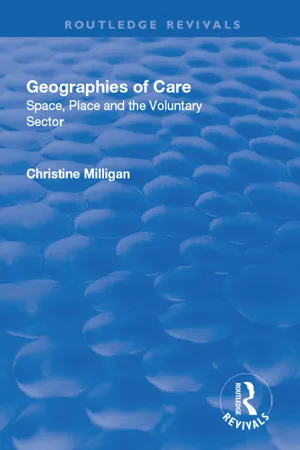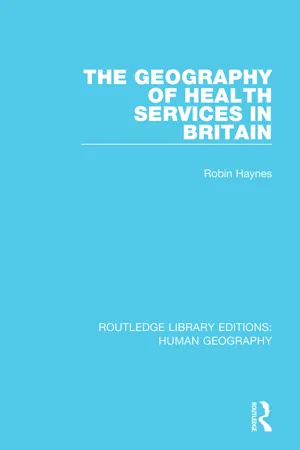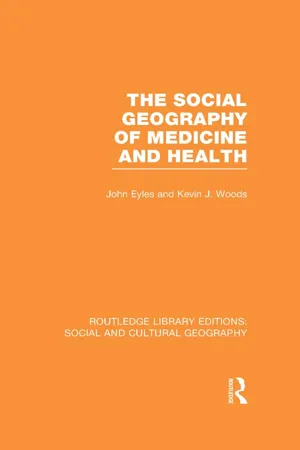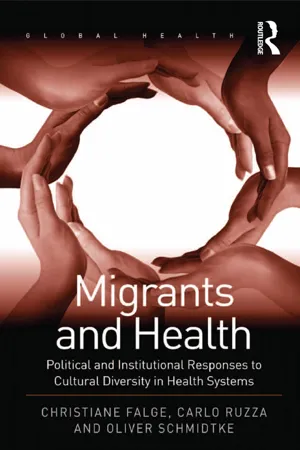Health Care Access
Health care access refers to the ability of individuals to obtain needed medical services. In the context of geography, it encompasses the spatial distribution of health care facilities and services, as well as the impact of geographic factors on individuals' ability to reach and utilize health care resources. Geographic disparities in health care access can result from factors such as distance, transportation infrastructure, and the availability of health care providers.
4 Key excerpts on "Health Care Access"
- eBook - ePub
Geographies of Care
Space, Place and the Voluntary Sector
- Christine Milligan(Author)
- 2017(Publication Date)
- Routledge(Publisher)
...2 Geographical Perspectives on Health Introduction As care has moved from institutional to community-based sites of delivery, concern has focused not only on the relocation of the locus of care, but also on the new sets of actors and agencies involved with its planning and provision. Attention is drawn to the ways in which decisions are made and how the social processes of care reform operate in particular places. The relationship between healthcare and the means through which social, cultural, political and economic influences alter the experience of health and illness across space and within places has been of particular interest to medical geographers in recent years. The study upon which this book is based builds on work that has emerged from several strands of contemporary geographical thinking. Such work maintains that for a clearer understanding of how and why specific patterns of health and healthcare emerge in particular places at particular times, there is a need to extend the focus of medical geography to incorporate a wider view of health and healthcare. These broadly embody the recognition of a need to move away from bio-medical approaches to the geographical analysis of health issues, to incorporate social models of health and healthcare. Such approaches also highlight the potential benefit of integrating multi-disciplinary perspectives to geographical analyses, and the need to understand how wider contextual factors impact on experiences of health and healthcare. To understand why these issues are of importance here, this chapter gives a brief history of the development of medical geographical thinking, identifying some of the main elements that have informed the study...
- eBook - ePub
- Robin Haynes(Author)
- 2015(Publication Date)
- Routledge(Publisher)
...Through the application of many decisions about the viability of individual service locations under the constraints of fixed budgets, a 'trade-off' has developed between the principle of equal access and the expense of supplying services above the level of national norms. As Bloor et al. (1978) have pointed out, this trade-off is a political question. The principle of equality of access to health care is denied by many acknowledged barriers: difficulties in defining and recognising ill health, difficulties in making an appointment and in making the journey, difficulties in communicating with the doctor, and so on. Geographical access is only one barrier among many, and it is not necessarily the most difficult to remove, as the high level of medical facilities for the oil rigs demonstrates. Bloor and his colleagues see remoteness simply as 'where there are problems of access which it has not been thought worthwhile to overcome' (Bloor et al., 1978, p. 28). For people living in sparsely populated areas, felt needs for health care at least partly reflect the remoteness of the service to them. There is no evidence that these people suffer any less objectively defined morbidity than people living in more central locations: indeed, the evidence appears to be in the opposite direction. In the Western Isles, for example, Bloor found higher proportions of the elderly reporting long-standing illness and restricted activity than occurred nationally. Yet the Hebridean population was found to have different expectations of health care to those of the majority of the British population, exemplified by the low value the island elderly put on teeth. People of the Western Isles seemed not only careless about the preservation of their natural teeth but also about their false teeth, for more than a third of those with false teeth did not wear them...
- eBook - ePub
- John Eyles, Kevin Woods(Authors)
- 2014(Publication Date)
- Routledge(Publisher)
...In any event, such institutional analysis does demonstrate the close association between health and society. It also shows how a consideration of geographical variations in the allocation of health care resources may lead to an examination of state practice and of the interactions between state and economy. We would argue that such analysis shows not the irrelevance but the strength of geographical approaches to the study of health care. Indeed, health care policy must have a geographical component in that resources are allocated on a territorial basis. Such allocation is likely to remain as the various aspects of medical care are effectively directed at populations in areas, as the Cuban experience shows (see Chapter 6). A greater understanding of state and bureaucratic practices is likely to feed back into spatial allocation policies. The mutually interactive nature of health-health policy-society relationships is thus demonstrated. Indeed, it is important to note that while systemic constraints limit health care developments, they may also enable others to take place. And the constraints themselves may be shaped by health care practice and experience (see below). Models of Society and Health Care We have suggested throughout this book that the nature of health care provision is both shaped and affected by social structure and the models of society emanating from that structure. We do not intend to repeat the points already made. All we wish to do in this section is make explicit three major models of society. Thus we suggest that there is not only one way of viewing society at any one time. We do accept the contention that there is a dominant model of society or meaning-system (Parkin, 1971) which significantly shapes the lives and experiences of people in any one society (see below)...
- eBook - ePub
Migrants and Health
Political and Institutional Responses to Cultural Diversity in Health Systems
- Christiane Falge, Carlo Ruzza(Authors)
- 2016(Publication Date)
- Routledge(Publisher)
...Respondents stated that there were vast differences in access to care, citing matters such as geographic region (where people reside and where they access services), peoples’ national or ethnic background, and varying concepts of health, socio-economic status, educational background, official language proficiency, legal status, gender and migration history. The variations in access also present a diversity of opinions on how access is viewed by different groups, depending on their relationship to the health care system (health care practitioners, policy-makers, migrant advocacy groups), and the characteristics of migrant communities (that is the size and duration of stay in the receiving country). The data characterizing the nature of access in the three cases compares and contrasts the barriers to access which emerge in the six cities in Canada, Germany and Italy. The argument in this chapter is that despite main differences in the overall governance of the health care systems in the three different countries, the challenges and barriers to accommodating cultural diversity show striking similarities. Knowledge of Services A significant barrier noted in all three countries, and seen as an explanation for the limited use of services is the lack of knowledge that immigrants have about the health care system, how it works and what services they have a right to access. In Montreal it was expressed that immigrants or refugees “come here and they don’t know the ropes, they don’t know the rules of the game” (representative, migrant association, Montreal, 2006)...



